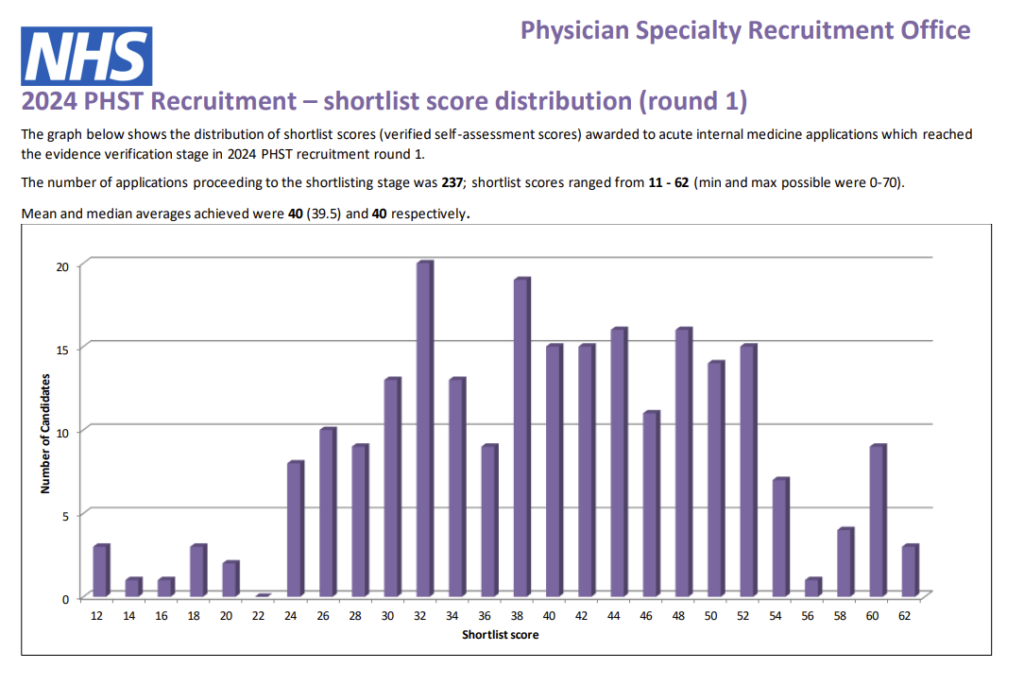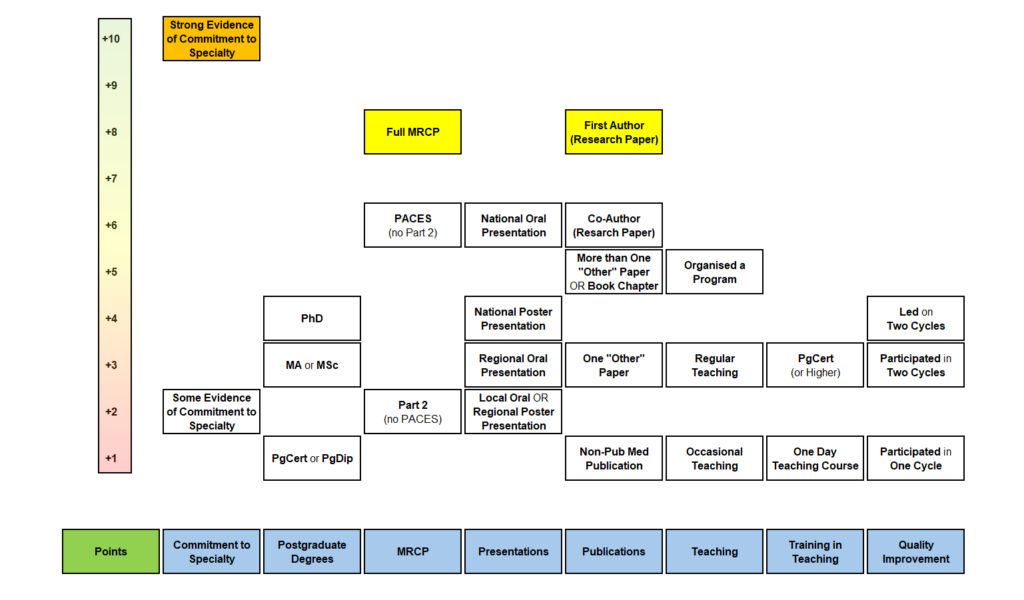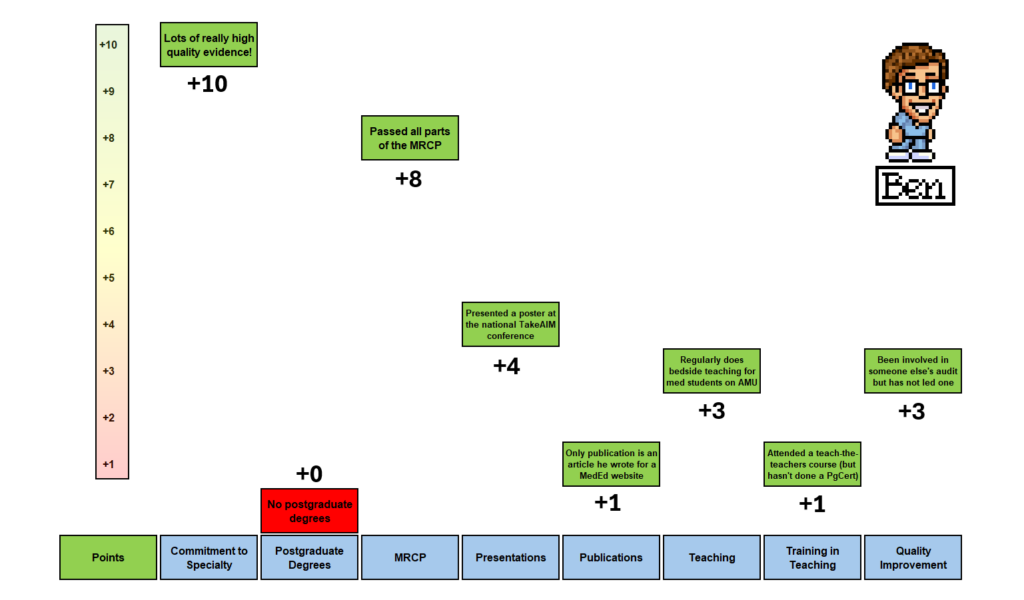Following on from our blog a couple of weeks ago, I thought I’d write something about the application form for ST4 in Acute Medicine. This is mainly for IMT3s applying this year, but might also be useful for IMT1-2s considering an application and looking to make themselves as competitive as possible.
A brief disclaimer – I’ve done my best to triple check my facts, but please refer directly to the PHST website for the most accurate and up-to-date information.
Now let’s start with the basics.
When submitting an application form for higher specialty training, the applicants works through eight domains, giving themselves a score in each. These domains are:
- Commitment to Specialty
- Postgraduate Degrees
- Membership of the Royal College of Physicians
- Publications
- Presentations
- Teaching Experience
- Training in Teaching
- Quality Improvement
These scores are then confirmed by the PHST team, who use them to shortlist candidates for interview. Now before we get into the nitty gritty of the scoring system, I want to make one thing very clear:
You do not need to max out on points.
I’ve had this conversation with a few of our local trainees, who are worried about dropping marks. The scores – which people spend months if not years thinking about – are simply there to get people to interview, because interviews are a much better way of evaluating how committed and capable someone is. Once you’ve reached the threshold to get an interview, the scores become much less relevant and it largely comes down to your performance on the day.
(We’ll be covering interviews in a separate blog post, don’t worry).
So, how many points do you need to score to get invited to interview? I can’t find that data published, but the Acute Medicine team will aim to interview as many people as possible, meaning you won’t need an earth-shatteringly high score to get your foot in the door.
We can look at last year’s scores to get a vague idea of what to expect.

Now, it’s difficult to draw any definite conclusions, as the scoring system for 2025 applicants has changed significantly since last year. Most noticeably, the maximum number of points is now just 48 (down from 70 in 2024). But a couple of things do jump out at me as I look at this data:
- nobody who applied to Acute Medicine scored full points
- mean and median points were both 40 (just 57% of the total)
If this trend continues, we might expect the average score this year to be approximately 27 points. Now FULL DISCLAIMER I have no way of knowing how scores will pan out, or how many points you’ll need to get interviewed this year. But my gut feeling is that 30 points would put you in pole position.
So how do we get to 30? Let’s take a closer look at the scoring matrix:

The key takeaway for me is how overpowered Commitment to Specialty and Full MRCP are in this equation. If you’ve passed PACES and have a CV that screams “I LOVE Acute Medicine!”, you instantly score 18 points, more than halfway to my arbitrary magic cut off of 30. If you’ve only passed Part 1 and have no idea what Acute Med is all about, you’ve got a long way to go.
Let’s work this one through with two of this year’s applicants to Acute Medicine, Ben and Dave.

Ben has been to multiple SAM events, he’s been involved in the SAMBA audit and he’s presented an interesting case from one of his take shifts as a poster at a takeAIM conference. He’s also got a couple of Greatix reports about how hard he works on AMU and a letter from his supervisor (an acute physician) commenting on how much of an asset they feel he’d be to the specialty.
Ben nets full points for commitment to specialty easily (+10), but he doesn’t have the most academic of CVs and has spent most of IMT getting his MRCP exams out of the way (+8). He takes a look at the form and starts to get a little worried:

Despite dropping marks in most domains, Ben still scores a total of 30 points.
He finds out that Dave is also applying. Dave is a career rheumatologists and the darling of the local IMT program. Dave’s applied for rheum, but thought he’d put in a cheeky back-up application to Acute Medicine. His high flying academic career means he’s not had time to get his MRCP yet, but he has Part 2 and PACES booked for later in the year. Dave’s CV is pretty glowing:

…and he still ONLY just matches Ben in the scoring matrix! Despite his achievements, Dave also scores 30 points, because his application form doesn’t mention Acute Medicine at all.
This just demonstrates that – as amazing as Dave’s achievements are – the best thing you can do to ensure success is to get your MRCP done and demonstrate that you are fully committed to a career in Acute Medicine.
Commitment to Specialty is doubly important because it factors very heavily in interview scoring as well. More than any other skill, attribute or achievement, this decides who will be offered a job and who won’t.
Why is this? Well as discussed in a previous blog, 85% of applicants to Acute Medicine also apply to another specialty. Regrettably, many see us as their “back-up”, applying with glowing CVs that evidence their passionate commitment to a career… somewhere else.
In the nicest possible way, we don’t want to offer jobs to people who don’t want them. We want to offer them to doctors like Ben, who has already made a massive contribution to our specialty.
So let’s say you’re Ben. How do you show off your love of Acute Medicine?
TakeAIM and SAM conferences are a good place to start. Getting a poster presented at either? Even better. If there’s an Acute Med trainee or consultant working near you, go and have a chat to them. There will be projects they’re involved with that they’d love your help with. In my experience, AMU consultants are a very approachable bunch and desperately keen to inspire the next generation. I’m sure there’s someone working nearby who’d love to mentor you.
You also need to have a good understanding of what Acute Medicine is. I think my wife just about knows what I do for a living, but she’s been living with me for six years. My parents think I’m an A&E doctor and my daughter thinks I work at an orchard picking apples (in her defence, she is 3). So make sure you can articulate this nicely and succinctly. We’ll cover that elsewhere in the months ahead.
We’ll definitely be writing more about the application process over the next few months. If you’re applying and have any questions, we’d love to hear from you. You can reach us here.
